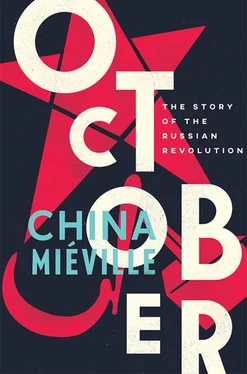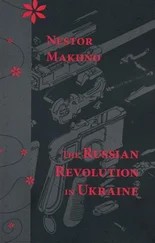The embattled narodniks plan more attacks. In March 1887, St Petersburg police break up a plot against the new tsar’s life. They hang five student ringleaders, including the son of a school inspector in the Volga region, a bright, committed young man called Alexander Ulyanov.
In 1901, seven years after the brutal and bullying Alexander III dies – of natural causes – and his dutiful son Nicholas II takes the throne, several narodnik groups merge, under a non-Marxist agrarian socialist programme (though some of its members consider themselves Marxists) focusing on those particularities of Russia’s development, and its peasantry. They anoint themselves the Socialist Revolutionary Party, henceforth better known as the SRs. They still hold with violent resistance: for a while yet, the SRs’ military wing, its ‘Combat Organisation’, does not flinch from a campaign of what even its advocates call ‘terrorism’, the assassination of government figures.
Given such commitment, there is irony to come. One of the party’s leaders, the extraordinary Evno Azef, leader of the Combat Organisation itself for some years, will within a decade be unmasked as a faithful Okhrana agent, in a hammer blow to the organisation. And a few years later, in the pivotal moments of the revolutionary year of 1917 itself, two more, Catherine Breshko-Breshkovskaya and its main theoretician Victor Chernov, will be high-profile and anxious partisans of order.

In the final years of the nineteenth century, the state pours resources into its infrastructure and industry, including an immense programme of railway building. Great crews drag iron rails across the country, hammering them down, stitching the limits of the empire together. The Trans-Siberian Railway. ‘Since the Great Wall of China the world has seen no one material undertaking of equal magnitude,’ breathes Sir Henry Norman, a British observer. For Nicholas, the building of this transit route between Europe and East Asia is a ‘sacred duty’.
Russia’s urban population soars. Foreign capital flows in. Huge industries arise around St Petersburg, Moscow, the Donbass region in Ukraine. As thousands of new workers struggle to eke out livings in cavernous plants under desperate conditions, subject to the contemptuous paternalism of their bosses, the labour movement takes unsteady steps forward. In 1882, the young Grigory Plekhanov, later to be Russia’s leading socialist theorist, joins the legendary Vera Zasulich herself, the failed assassin of Trepov, to found Osvobozhdenie truda, Liberation of Labour – the first Russian Marxist group.
In its wake come more reading circles, cells of agitators, gatherings of the variously like-minded, aghast at a world of ruthless, exploitative capital and the subordination of need to profit. The future for which the Marxists yearn, communism, is as absurd to their detractors as any peasant’s Belovode. It is rarely distinctly outlined, but they know it beckons beyond private property and its violence, beyond exploitation and alienation, to a world where technology reduces labour, the better for humanity to flourish. ‘The true realm of freedom’, in Marx’s words: ‘the development of human powers as an end in itself’. This is what they want.
The Marxists are a gaggle of émigrés, reprobates, scholars and workers, in a close weave of family, friendship and intellectual connections, political endeavour and polemic. They tangle in a fractious snarl. Everyone knows everyone.
In 1895, a Union of Struggle for the Liberation of the Working Class is formed in Moscow, Kiev, Ekaterinoslav, Ivanovo-Vosnessensk and St Petersburg. In the capital, the founders of the Union are two fervent young activists: Yuli Tsederbaum and his friend Vladimir Ulyanov, brother of Alexander Ulyanov, the narodnik student executed eight years before. Noms de politique are the norm: Tsederbaum, the younger of the two, a scrawny figure peering through pince-nez over a thin beard, calls himself Martov. Vladimir Ulyanov, a striking, prematurely balding man with distinctive narrow eyes, is known as Lenin.
Martov is twenty-two, a Russian Jew born in Constantinople. He is, in the words of one leftist sparring partner, ‘a rather charming type of bohemian… by predilection a haunter of cafés, indifferent to comfort, perpetually arguing and a bit of an eccentric’. Weak and bronchial, mercurial, talkative but a hopeless orator, not much better as an organiser, affecting, in these early days, a worker’s get-up, Martov is every inch the absent-minded intellectual. But he is a celebrated mind. And while certainly not above the sorts of sectarian machination typical of political hothouses, he is renowned, even among his adversaries, for integrity and sincerity. He is widely respected. Even loved.
As for Lenin, all who meet him are mesmerised. As often as not, it seems, they feel driven to write about him: libraries’ worth of such books exist. He is a man easily mythologised, idolised, demonised. To his enemies he is a cold, mass-murdering monster; to his worshippers, a godlike genius; to his comrades and friends, a shy, quick-laughing lover of children and cats. Capable of occasional verbal ogees and lumbering metaphors, he is a plain rather than a sparkling wordsmith. Yet he compels, even transfixes, in print and speech, by his sheer intensity and focus. Throughout his life, opponents and friends will excoriate him for the brutality of his takedowns, his flint and ruthlessness. All agree that his is a prodigious force of will. To an extent unusual even among that ilk who live and die for politics, Lenin’s blood and marrow are nothing else.
What particularly distinguishes him is his sense of the political moment, of fracture and traction. To his comrade Lunacharsky, he ‘raise[s] opportunism to the level of genius, by which I mean the kind of opportunism which can seize on the precise moment and which always knows how to exploit it for the unvarying objective of the revolution’.
Not that Lenin never makes mistakes. He has, however, an acutely developed sense of when and where to push, how, and how hard.
In 1898, a year after Lenin is banished to Siberia for his activities, the Marxists organise into the Rossiskaya Sotsial-Demokraticheskaya Rabochaya Partiya, the Russian Social-Democratic Workers Party (RSDWP). For several years, despite such periods of exile, Martov and Lenin remain close collaborators and friends. With characters so different, exasperations are inevitable, but they complement and like each other, a pair of Marxist Wunderkinder .
From Marx, whatever their divisions over other points, the RSDWP thinkers take a vision of history as necessarily proceeding through historical stages. Such ‘stageist’ conceptions can differ wildly in terms of detail, degree and rigidity – Marx himself opposed extrapolating his ‘historical sketch’ of capitalism into a theory of an inevitable path for all societies, as ‘both honouring and shaming me too much’. Still, it is uncontroversial among most Marxists at the end of the nineteenth century that socialism, the initial phase beyond capitalism and en route to communism, can only emerge from bourgeois capitalism, with its particular political freedoms and its working class positioned to take control. It follows that autocratic Russia, with its huge rural masses and small working class (substantially made up of semi-peasants), with its private estates and omnipotent tsar, is not yet ripe for socialism. There is, as Plekhanov puts it, not yet enough proletarian yeast in Russia’s peasant dough to make a socialist cake.
Serfdom is a living memory. And a few miles beyond the cities, peasants still dwell in medieval squalor. In winter, farm animals share their homes and fight for space by the stove. A stench of sweat, tobacco and lamp fumes. Whatever improvements are slowly coming, many villagers still walk barefoot through muddy, unpaved streets, and latrines are open pits. Agricultural decisions about common land are reached by no more rigorous a system than competing shouts in chaotic village meetings. Transgressors of traditional mores are subjected to what is called ‘rough music’, cacophonous intervention, public shaming, a sometimes murderous violence.
Читать дальше












